- Home
- Peter F. Hamilton
Judas Unchained cs-2 Page 2
Judas Unchained cs-2 Read online
Page 2
“Too neat?”
The tone of disbelief in his voice made her wince. “Yeah, I know, I know. But something bothers me. That loft apartment, those girls, it all shouted out,
‘Here are dumb rich kids, come and rip them off.’ ”
“I don’t get this. Who’s in the wrong here, the Guardians or the Halgarths?”
“Well…Okay, I don’t suppose it could have been the Halgarths, unless that really was an entrapment operation.”
He grinned at her. “You’re getting as bad as the boss when it comes to conspiracies. You’ll be blaming the Starflyer next.”
“Could do.” She gave him a weak smile. “But I’m still going to tell her I think something’s odd about this one.”
“Career suicide.”
“Come on! What kind of a detective are you? We’re supposed to act on intuitive hunches. Don’t you watch any cop soaps?”
“Unisphere shows are for people without lives. Me, I’m busy in the evenings.”
“Yeah,” she said snidely. “Still putting on your navy uniform when you go around the clubs?”
“I’m a naval officer. Why shouldn’t I?”
Renne laughed. “God! Does that really work?”
“It does if you can find girls like those three.”
She sighed.
“Listen,” he said. “I’m serious. What can you tell Myo? You had a feeling? She’ll just bawl you out big time. And don’t look to me to back you up. There was nothing wrong with it.”
“The boss appreciates the way we consider cases. You know she’s always saying we have to take a more holistic approach to crime.”
“Holistic, yeah, not psychic.”
They were still arguing about it forty minutes later when they arrived back at the Paris office. Five uniformed navy officers were standing in a group outside Paula Myo’s office.
“What’s happening?” Tarlo asked Alic Hogan.
“Columbia’s in there with her,” the Commander said. He looked very uncomfortable.
“Christ,” Renne muttered. “It’ll be the LA fiasco. I was supposed to be chasing the leads from that operation this morning.”
“We all were,” Hogan said. He forced his gaze away from the closed door.
“Did you find anything in Daroca?”
Renne was trying to think what to say; Hogan was very by-the-book.
“It was a standard Guardians operation,” Tarlo said quickly. He was staring hard at Renne. “We left forensics working through the scene.”
“Good. Keep me updated.”
“Yes, sir.”
“Standard operation,” Renne said scathingly as they walked back to their desks.
“I just saved your ass back there,” Tarlo said. “You can say all that kind of intuition stuff to the boss, but not Hogan. All that little prick is interested in is checkmarks in the box.”
“Okay, okay,” she grumbled.
Paula Myo walked out of her office, carrying her shoulder bag and the little rabbakas plant she kept on the windowsill. A red-faced Rafael Columbia was standing behind her, dressed in his full admiral’s uniform.
Renne had never seen Myo look so shocked. It sent a cold shiver down her own spine; nothing ever ruffled the boss.
“Good-bye,” Myo told the office at large. “And thank you for all the hard work you did for me.”
“Paula?” Tarlo gasped.
She gave him a small shake of her head, and he fell silent. Renne watched Paula Myo walk out; it was like seeing a funeral procession.
“Commander Hogan,” Columbia said. “A word please.” He vanished back into Myo’s office. Alic Hogan almost ran in after him. The door closed.
Renne sat down hard. “That didn’t happen,” she mumbled incredulously. “They can’t get rid of her. She is the goddamn Directorate.”
“But we’re not the Directorate,” Tarlo said quietly. “Not anymore.”
CHAPTER ONE
The harsh sound of ion pistol shots sizzled out of the speakers to reverberate around the LA Galactic security office. They were swiftly drowned out by the screams. Commander Alic Hogan watched the screens in numb horror as the assassin left the scene of Kazimir’s murder behind, running along the central concourse of the Carralvo terminal, shooting as he went. Terrified passengers were throwing themselves flat or ducking down behind the railings.
“Squad B are on the upper concourse,” Renne reported from her console.
“They have clear line of sight.”
“Take him out,” Hogan ordered.
He watched a grainy camera image as the ion pulse from the squad’s sharpshooter struck the assassin. A corona of purple sparks flared briefly, outlining the running figure.
“Damnit,” Hogan hissed.
Two more ion pulses hit. Sparks were fountaining across the concourse, burning into walls and advertising panels; people shrieked as tendrils of static writhed over their clothing, singeing deep. Smoke alarms went off, adding their howl to the general din.
“He’s wearing a force field suit,” Renne exclaimed. “They can’t penetrate from that range.”
Hogan opened the general communications icon in his virtual vision. “All squads close in on the target. Pursue until he’s in open ground, then open fire. Overload that force field.” As he watched the squads putting the new tactic into play, screens on every console started to flicker. In his virtual vision, red warning graphics sprang up across his interface with the station’s network.
“Kaos software has been released into the local network nodes,” his e-butler reported. “The controlling RI is attempting to clear it.”
“Goddamnit!” Hogan’s fist thumped into his console. On the other side of the room, Senator Burnelli was rising from her seat. She looked distraught, her beautiful young face twisted by some unfathomable guilt. More camera images vanished from the screens in a maelstrom of static. Only one image of the assassin remained, taken from a roof sensor. Hogan watched him race along a ramp to platform 12A. Two navy officers were chasing after him, a hundred meters behind. Ion shots were exchanged. The image drizzled away into gray haze. A harsh groan crept out of Hogan’s throat. This couldn’t be happening! It was an absolute disaster. Worse, it was happening in front of the Senator who’d given them their first ever real lead into the Guardians, a lead Hogan had been desperate to follow up.
Hogan’s virtual hand flew over icons, pulling out secure audio channels from the squads. At least the navy’s dedicated systems weren’t too badly affected by the kaos.
“He’s on the platform, he’s on the platform!”
“With you, coming to twelve-A through the second ramp.”
“Shooting.”
“Wait! No, civilians!”
“Vic, where are you?”
“There’s a train coming in.”
“Vic? For Christ’s sake.”
“Fuck! He jumped down. Repeat, target is on the tracks. He’s on the tracks leading out westward.”
“Get after him,” Hogan ordered. “Renne, who have we got outside?”
“Squad H is nearby.” She was pulling ground plans out of a handheld array that was unaffected by the kaos. “Tarlo, are you there, can you intercept?”
“We’re on it.” Tarlo’s terse comment was accompanied by the sound of thudding footsteps.
Hogan was vaguely aware of the Senator and her bodyguards leaving the security office. His e-butler had brought up a translucent 3D map of the Carralvo terminal into his virtual vision. The westbound track from platform 12A slid out into a broad area of a hundred crisscrossing tracks, a major junction zone between the passenger terminal and a cargo yard, which eventually curved around toward the cliff of gateways five kilometers to the north.
“He’ll never make it there,” Hogan muttered. He turned to Tulloch, the CST security liaison officer. “Are any of your teams outside?”
The man nodded. “Three teams. They’re converging now. This kaos doesn’t help, but they’ve got clean communica
tions. Don’t worry, we’ll seal him up inside that junction. He’s not going anywhere.”
Hogan looked around the security office again, seeing his people glaring in frustration at their useless consoles. All they could do was wait until the RI purged the station network. Down on the ground, teams were calling out coordinates to each other. His inserts were assigning them places on the map. It was a wide circle surrounding the western track of platform 12A, a very loose circle. Renne was issuing a stream of orders, trying to close the gaps.
“I’m going down there,” Hogan announced.
“Sir?” Renne broke off from the tactical situation to give him a surprised glance.
“Take over here,” he told her. “I might be able to help down there.” He saw the brief flicker of doubt on her face before she said, “Yes, sir.” Hogan was all too aware of how widespread that uncertainty had become among the officers under his command; the Paris office he’d inherited from Paula Myo had never considered him anything other than Admiral Columbia’s placeman, a political appointee who wasn’t really up to the job. At the start of this observation operation he’d hoped he might finally gain their respect. Now that hope, too, seemed to be vanishing along with the assassin.
The kaos that was wreaking electronic havoc on LA Galactic was starting to be felt on a physical level. Hogan had to use the stairs at the end of the Carralvo office block to get down to the concourse. The safety system on every elevator in the building had tripped, halting them wherever they were in the shafts. He dashed down the four flights of stairs from the security office, arriving on the ground floor only mildly out of breath. Out on the concourse, a tide of panicked people was buzzing around in disarray. Frightened by the murder and the chase, confused by the collapse of the local network, they didn’t know which way to flee. It didn’t help that almost every alarm was now sounding, and scarlet holographic arrows indicating the emergency exits were sliding through the air above them in contradictory directions.
Hogan pushed through them, oblivious to the curses they hurled at him. He was listening to the squads on the secure communications channels. It wasn’t sounding good. There were too many queries, too many of them shouting, “Which way?” They were all too reliant on the officers up in the security office coordinating the operation, arranging them into neat sweep patterns, watching the situation through the station’s primary sensors. Have to change training procedures, he thought absently. His map showed the ragged circle of his officers and the SCT teams closing slowly on the assassin’s supposed position.
He pulled out his own ion pistol as he charged up the ramp to platform 12A. The few passengers left were all curled up next to walls and pillars; they flinched as he sprinted past and dropped down onto the track. Bold amber holograms at the edge of the platform warned him not to proceed any farther. He ignored them and raced toward the end of the terminal where the sunlight streamed down past the high arching roof. Renne’s voice was still calm and level in his ears as she told people where to turn, what direction to take. Despite that, there were still big gaps in the noose contracting around the assassin. Hogan clenched his jaw and said nothing, but he was furious with their ragged deployment. It was only when he emerged into the flood of California sunlight that he saw the reason. The whole junction area represented on his virtual map, so neatly laced with various tracks, was in reality a harsh environment of concrete and steel sprawling for kilometers in every direction. Along one side were the bulky warehouses and loading gantries of the cargo yard, where machines and bots were in constant motion. But ahead of him, dozens of trains were winding their way across the junction: from ponderous kilometer-long freighters pulled along by huge GH9 engines to trans-Earth loop trains; twenty-wagon intrastation goods shunters as well as the sleek white express trains chasing past at frighteningly high speed. They filled the air with metallic screeching and a thunderous rattling, a constant racket that was overlaid by the clunks and clangs of what must have been small ships colliding. It was a noise he had always been oblivious to as he rode in the conditioned comfort of the first-class passenger carriages.
The kaos attack made no impact on the station’s traffic control. CST, ever anxious about sabotage or even natural catastrophe, used independent ultra-hardened encryption to maintain full communications with and control of the trains at all times and under any circumstances; they’d even prevailed during the alien assault on the Lost23.
Hogan almost skidded to a halt as a fast cargo train sped past fifty meters to his left. He could feel the wind of its slipstream on his face. Several squad members were visible spread out in the distance ahead of him, all of them holding their weapons ready, trying to look in every direction at once.
Hogan touched the virtual icon that put him in direct contact with Tulloch. “For Christ’s sake, shut down the traffic out here! We’re going to get pulped into the landscape.”
“Sorry, Alic, I’ve already tried; transport control won’t do it without executive-level authority.”
“Shit!” As Hogan watched, one of his people suddenly sprinted sideways. A two-hundred-meter-long snake of tanker trucks hauled by a GH4 engine trundled along the line he’d been standing on. “Renne, get Admiral Columbia to set off a nuke under CST. I want these goddamn trains shut down. Now!”
“Working on it, sir. The kaos is being flushed. Should have full sensor coverage back in a few minutes.”
“Christ.” He spat under his breath. Just how many disasters can you pile up in one day? He hurriedly sidestepped off the actual track itself, and began jogging toward the erratic line of squad members up ahead. “Okay, people, let’s get more organized. Who was the last person to actually see our target?”
“Couple of minutes ago, he was two hundred meters ahead of me, heading northwest.”
Hogan’s virtual vision identified the speaker as John King, and tagged his position on the map.
“Positive sighting, sir. I’ve got him on the other side of this flatbed shunter,” Gwyneth Russell said. Her location was nearly a half of a kilometer away from John’s.
“When?” Hogan demanded.
“He jumped behind it maybe a minute ago, sir.”
“I can confirm that,” Tarlo said. “My squad is due north of Gwyneth. The flatbed shunter has just reached us. He’s on the other side of it.”
Hogan scanned the direction his map indicated Tarlo’s squad was deployed. A fast-moving train of cylindrical containers was zipping along a rail between him and the squad. He thought he could see another train moving on the other side of it, through the gaps between the containers. Might have been the flatbed shunter. It was a confusing flicker of motion.
There was a brief ebb to the background clamor, and he heard a high-pitched humming from the concave gully on his right-hand side, the sound of high-voltage cables. Hogan looked down at it, frowning. He’d assumed it was a long enzyme-bonded concrete storm drain of some kind, about three meters wide and one deep. The gray surface was rippling slightly, and the entire gully behind him moved across the ground, linking up to another gully running parallel to it twenty meters away.
Maglev track!
Hogan flung himself down onto the hard granite chippings, and put his hands over his head. An express train hurtled past, its slipstream howling. His uniform jacket flapped around like a sail in a tornado. For an instant he thought the air pressure was going to be strong enough to lift him off the ground. He shouted wordlessly into the bone-shaker yowl as animal fear surged through him. Then the express was gone, its rear strobe light blinking into the distance.
It took a minute for his legs to stop shaking enough to carry his weight. He clambered slowly to his feet, looking nervously along the innocuous gully for any sign of another express.
“He’s not here,” Tarlo called. “Sir, we missed him.”
Hogan’s map showed him a big concentration of squad members along a section of track, with Tarlo in the middle.
“We can’t have,” Gwyneth insisted. “For God�
�s sake, I saw him behind the train.”
“Well, he didn’t come this way.”
“Then where, for fuck’s sake?”
“Can anyone see him?” Hogan asked. “Somebody?”
He received a chorus of “Not here,” “No, sir.”
As he walked unsteadily away from the maglev track, his virtual vision showed him the station network slowly reestablishing itself. Renne had pulled a junction routing schedule from traffic control, and was using it to warn everybody of approaching trains.
“Keep everyone in their positions,” he told her. “I want a perimeter around this junction. He can’t have reached the edges yet. We keep it sealed until we have full electronic coverage again.”
“Yes, sir,” she answered. “Oh, we just got some additional help.”
A couple of black helicopters swooped low over the junction, with LAPD written in white on their underbelly. Hogan glared at them. Oh, great, just like the marina fiasco. The cops will be laughing their asses off at us.
Clear sensor images were flipping up into a grid in his virtual vision as the kaos cleared. He heard the first of the trains braking, a teeth-jangling screech that cut clean across the junction. It was joined by another, then another, until every train was slowing to a halt.
Finally the junction was silent, the trains motionless. “All right, people,” Hogan announced grimly, “let’s sweep this area sector by sector.”
Two hours later Alic had to admit defeat. They’d searched every inch of the junction, visually and with sensors. The assassin was nowhere to be found. The perimeter of his own squads and CST security teams remained unbreached. Yet the target had somehow eluded them.
From his makeshift field command post on platform 12A, Hogan watched the tired, despondent squads trekking in from all across the junction. It was a wretched blow to everyone’s morale. He could see it in their expressions, the way they wouldn’t meet his eyes as they passed.
Tarlo stopped in front of him, looking more angry than disappointed. “I don’t get it. We were right behind him. The others were all around. There’s no way he could have got past us, I don’t care what he was wetwired with.”

 A Night Without Stars
A Night Without Stars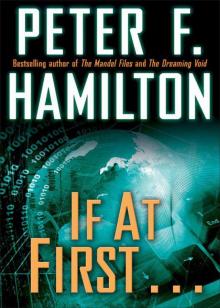 If at First . . .
If at First . . .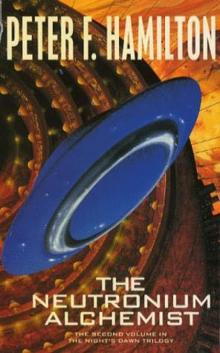 The Neutronium Alchemist
The Neutronium Alchemist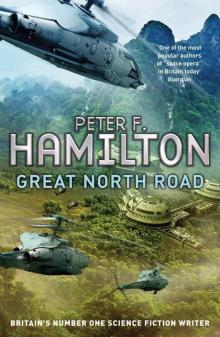 Great North Road
Great North Road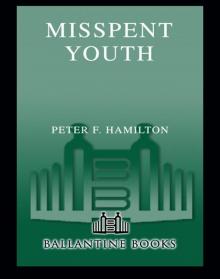 Misspent Youth
Misspent Youth Pandora's Star
Pandora's Star The Evolutionary Void
The Evolutionary Void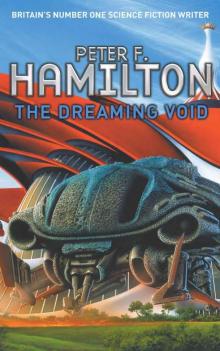 The Dreaming Void
The Dreaming Void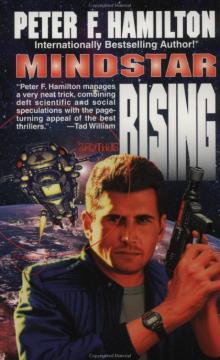 Mindstar Rising
Mindstar Rising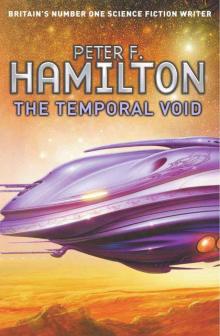 The Temporal Void
The Temporal Void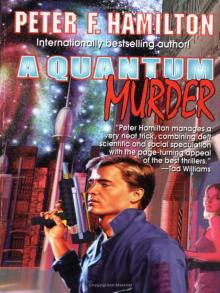 A Quantum Murder
A Quantum Murder The Hunting of the Princes
The Hunting of the Princes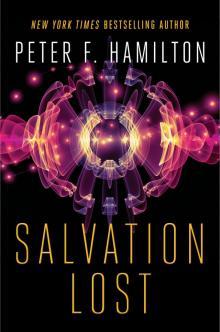 Salvation Lost
Salvation Lost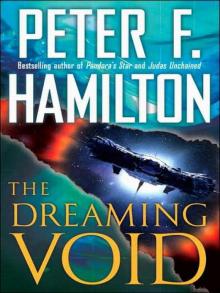 The Dreaming
The Dreaming Salvation
Salvation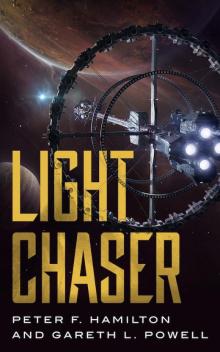 Light Chaser
Light Chaser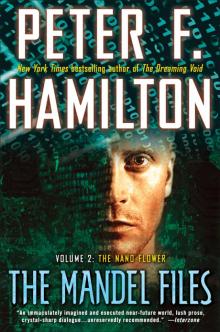 The Mandel Files, Volume 2: The Nano Flower
The Mandel Files, Volume 2: The Nano Flower![The Saints of Salvation [British Ed.] Read online](http://i1.bookreadfree.com/22/the_saints_of_salvation_british_ed__preview.jpg) The Saints of Salvation [British Ed.]
The Saints of Salvation [British Ed.]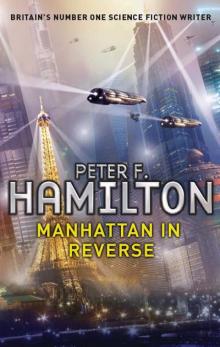 Manhattan in Reverse
Manhattan in Reverse The Secret Throne
The Secret Throne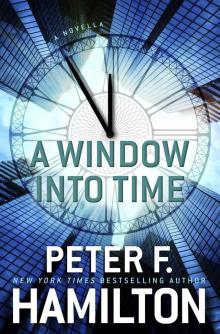 A Window Into Time
A Window Into Time A Second Chance at Eden
A Second Chance at Eden The Nano Flower
The Nano Flower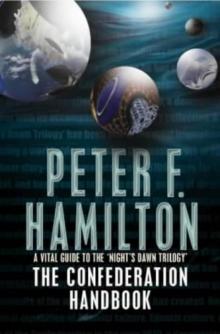 The Confederation Handbook
The Confederation Handbook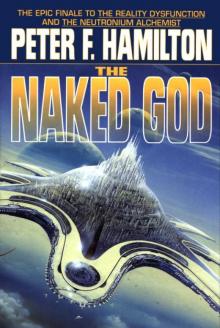 The Naked God
The Naked God The Saints of Salvation
The Saints of Salvation The Void Trilogy 3-Book Bundle
The Void Trilogy 3-Book Bundle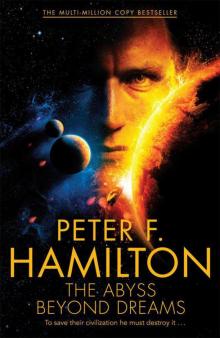 The Abyss Beyond Dreams
The Abyss Beyond Dreams A Voyage Through Air
A Voyage Through Air Judas Unchained
Judas Unchained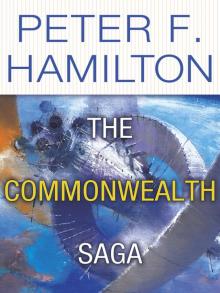 The Commonwealth Saga 2-Book Bundle
The Commonwealth Saga 2-Book Bundle The Naked God - Flight nd-5
The Naked God - Flight nd-5 Night Without Stars (Chronicle of the Fallers Book 2)
Night Without Stars (Chronicle of the Fallers Book 2)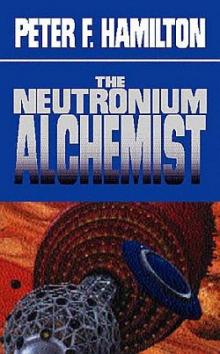 Neutronium Alchemist - Conflict nd-4
Neutronium Alchemist - Conflict nd-4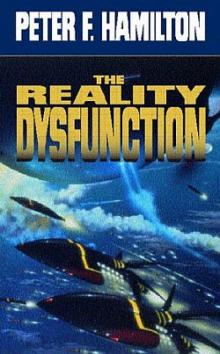 Reality Dysfunction - Expansion nd-2
Reality Dysfunction - Expansion nd-2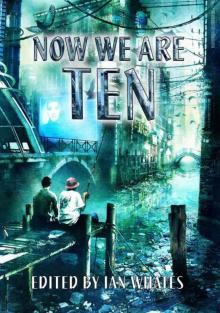 Now We Are Ten: Celebrating the First Ten Years of NewCon Press
Now We Are Ten: Celebrating the First Ten Years of NewCon Press Neutronium Alchemist - Consolidation nd-3
Neutronium Alchemist - Consolidation nd-3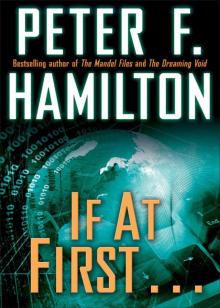 If at First . . . (Short Story)
If at First . . . (Short Story)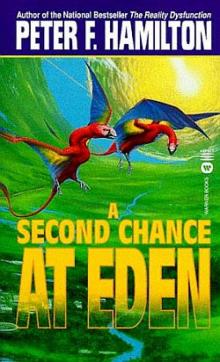 A Second Chance at Eden nd-7
A Second Chance at Eden nd-7 Judas Unchained cs-2
Judas Unchained cs-2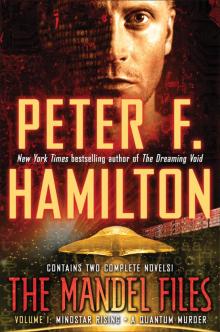 The Mandel Files, Volume 1
The Mandel Files, Volume 1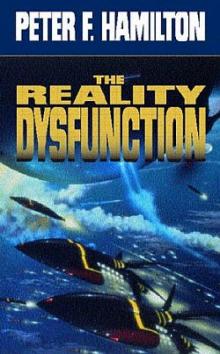 Reality Dysfunction — Emergence nd-1
Reality Dysfunction — Emergence nd-1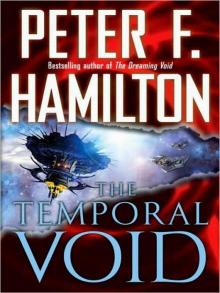 The Temporal Void (ARC)
The Temporal Void (ARC) The Mandel Files
The Mandel Files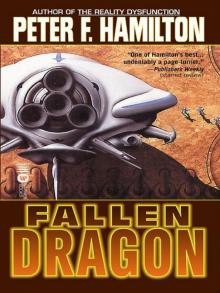 Fallen Fragon
Fallen Fragon Misspent Youth (commonwealth saga)
Misspent Youth (commonwealth saga)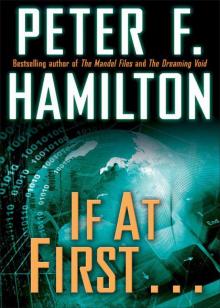 If at First...
If at First... Best of British Science Fiction 2016
Best of British Science Fiction 2016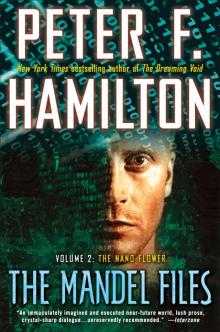 The Mandel Files, Volume 2
The Mandel Files, Volume 2 The Naked God - Faith nd-6
The Naked God - Faith nd-6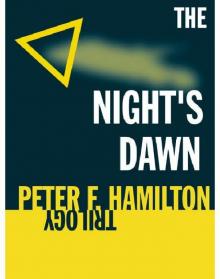 The Night's Dawn Trilogy
The Night's Dawn Trilogy Pandora's Star cs-2
Pandora's Star cs-2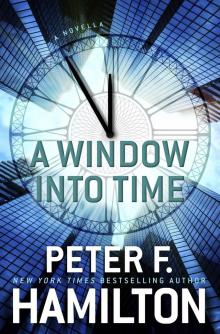 A Window into Time (Novella)
A Window into Time (Novella)